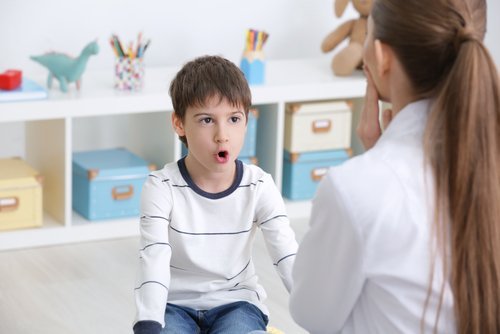Should I Be Worried If My Child Doesn't Talk Yet?

It’s true that there is an average age in which children should speak their first words.
However, each individual evolves at their own pace for each activity and this doesn’t necessarily impact his or her development.
From an early age, human beings manifest conditions that will reveal the perfect order of their natural development.
For example, searching for voices with their eyes, babbling spontaneously, giggling, etc. These and other signals are indications that there aren’t any problems with speaking or hearing.
Many times, the reason your child doesn’t make sounds or pronounce correctly has to do with upbringing. In other words, your little one may present this behavior simply out of laziness.
Despite this, that ever-present inner voice still says: “My child doesn’t talk yet.” This can be quite unsettling for parents. It’s hard to believe that it’s a simple act of caprice on their child’s behalf.
As a result, they wait a long time before consulting with specialists and obtaining a diagnosis for their child.
If your child has already turned two and articulates few words, or none at all, it’s time to talk with your pediatrician. Your child’s doctor will be able to evaluate your child’s development.
Getting an early diagnosis is extremely important. Many times, a delay in speech development can be a sign of a more significant issue .
Just the same, parents must accompany every step of the process in order for language stimulation to be positive for children.
Reading stories and carrying on constant conversation throughout the day strengthens communication from a young age. As a result, children improve their speaking skills.
“There is a language of the world that everyone understands: The language of enthusiasm, of things accomplished with love and purpose, and as part of a search for something believed in and desired”
—Paulo Coelho—
Suggestions for parents of children with speech difficulties
The role of parents should be an active one. If your child seems to have a speech delay, you should get involved and participate in the process of developing this ability.
- Children learn languages through hearing others speak around them, mainly by imitation. You’ll always be their best example. Speak slowly and clearly.
- Invest quality time in communicating with your children. Talk to your little ones from the time they are born and onward as they grow, inviting them to imitate your sounds.
- Don’t celebrate if your child makes phonetic errors. You might inadvertently reinforce the mistake.
- Play. For example, teach your child the sounds that different animals make. You can also imitate different motor vehicles: Cars, trains, motorcycles, fire trucks, etc.

Signs your child may have a language disorder
When is it time to be concerned that your child still doesn’t articulate words? Pay attention to the following signals:
- If at 12 months of age, your child doesn’t use gestures like waving hello and goodbye.
- When at 18 months of age, your son or daughter doesn’t comprehend words well or doesn’t make sounds.
- At 24 months, your child doesn’t construct simple phrases or only emits sounds.
Most common causes of speech delays in children
Oral factors
Issues with a child‘s mouth, tongue or palate are very common causes behind speech delays. Therefore, if your child is displaying a delay in speech, you should take him or her to see a specialist in this area.
Auditory factors
If children have difficulty hearing, they also have a hard time understanding the language around them. For that reason, they may make mistakes when pronouncing words.
Oral-motor factors
Sometimes there may be a problem in an area of the brain that is responsible for the articulation of speech. As a result, a lack of coordination between the tongue, lips and jaw occurs.

When should I take my child to see a specialist?
It’s common for parents not to realize that there’s a deeper issue when they ask themselves why their child doesn’t talk yet.
However, once they understand that their child needs professional help to overcome the problem, the road becomes much smoother.
In most cases, your child’s pediatrician can evaluate your child and identify the underlying cause of the speech delay. Once your doctor isolates the cause, then he or she can recommend you to a specialist.
The early intervention of a speech therapist will help your little one develop positively .
Speech therapists are responsible for diagnosis, prevention and treatments related to speech and language. During treatment sessions, the professional will carry out therapeutic exercises to improve your child’s language abilities.
He or she will also provide exercises for you to practice with your child at home to make treatment more effective.
All cited sources were thoroughly reviewed by our team to ensure their quality, reliability, currency, and validity. The bibliography of this article was considered reliable and of academic or scientific accuracy.
- Melgarejo, G. M., Maraver, M. J. T., & Sage, D. S. (2013). El retraso en el desarrollo del lenguaje y los problemas de comprensión lectora: una exploración del modelo simple de lectura. Revista de Logopedia, Foniatría y Audiología, 33(3), 136-145. https://www.sciencedirect.com/science/article/abs/pii/S0214460312000708
- Sotillo, M., & Rivière, Á. (1997). Algunas cuestiones sobre el desarrollo del lenguaje de referencia mental: los problemas de los niños con el lenguaje de estados mentales. Estudios de Psicología, 18(57), 39-59. https://www.tandfonline.com/doi/abs/10.1174/021093997320972034
- Barragán, P. E., & Lozano, S. S. (2011). Identificación temprana de trastornos del lenguaje. Revista Médica Clínica Las Condes, 22(2), 227-232. https://www.sciencedirect.com/science/article/pii/S0716864011704175
- Rodríguez, J. J., & Santana, A. M. M. (2010). Adquisición y desarrollo del lenguaje. A.(. Muñóz García, Psicología del desarrollo en la etapa de educación infantil, 101-120.